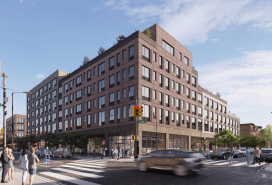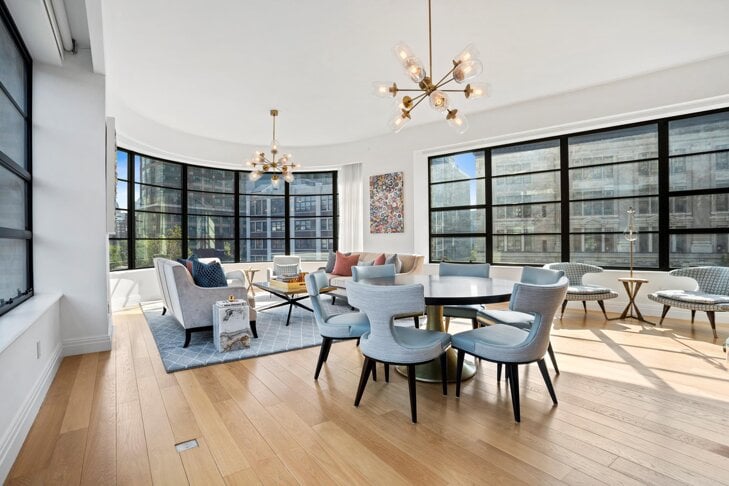Why you should read the fine print: the downsides of rental concessions

New buildings tend to be more likely to offer concessions.
Grisha Levit/Flickr
We've all heard the expression that there's no such thing as free rent, but if you peruse enough New York City rental listings you'll see plenty of offers of free rent—maybe even two months' worth.
In fact, according to a recent Citi Habitats report, move-in incentives by landlords continued to grow last month. In February, a full quarter of new leases included some sort of concessions for the tenant, according to the brokerage. Gary Malin, president of Citi Habitats, explains that these incentives have allowed landlords to keep their face rents high.
Incentives—or concessions—usually come in the form of a landlord paying the broker fee, and one or two month's free rent. They're more common during slower months, and in new buildings where the management company is trying to fill a lot of apartments.
For apartments with "free rent," the rental credit usually applies to the last month of the lease, which will be free. The "net effective" rent you often see quoted in a listing is the monthly rent taking into account the savings you'll have from that free month's rent. But it's not the amount you'll actually pay per month—that'll be more (it's known as "gross rent"). So if your monthly rent is $3000, and you get a free rent for the final month at the end of the lease, your "net effective" rent is $2750.

Brick Underground's
Gross Rent Calculator
What's this?
Some New York City landlords offer a free month (or more) at the beginning or end of a lease. The advertised rent is the net effective rent. The net effective rent is less than the amount you will actually have to pay --- known as your gross rent --- during your non-free months.
Brick Underground's Gross Rent Calculator enables you to easily calculate your gross rent, make quick apples-to-apples comparisons between apartments and avoid expensive surprises. All you'll need to figure out your gross rent is 1) the net effective rent, 2) the length of your lease, and 3) how many free months your landlord is offering. [Hint: Bookmark this page for easy reference!]
To learn more about net effective versus gross rents, read What does 'net effective rent' mean?.
If the landlord is offering partial months free, enter it with a decimal point. For example, 6 weeks free rent should be entered as 1.5 months.
The reason landlords do it this way is so that when it's time to renew the lease, their rent increase is based on the higher number (the "gross rent"), not the lower, "net effective" one. If you're planning to stay on past one lease cycle, you want to make sure you can afford the gross rent, and then some, assuming that they'll raise the rent.
"For long term renters, [a free month] may not be the golden goose. You could be putting yourself in a precarious position," says Neeta Mulgaokar, an agent with Mirador Real Estate. "I’m totally for incentives for some people, and totally against it for others," she says, adding that she urges her clients who want short-term leases to look for concessions, since they'll offer serious savings.
Pocketing a free month's rent is a hollow victory if you have to choose between overpaying or moving when your lease is up. For expert help finding buildings offering the most valuable concessions, negotiating with landlords and leasing agents, and generally getting the best possible deal, put your search into the smart and capable hands of Triplemint. A tech-savvy real estate brokerage founded by a pair of Yale grads in response to the frustrating apartment-search experiences of classmates and colleagues, Triplemint will charge a broker's fee of 10 percent of a year's rent on open listings instead of the usual 12 to 15 percent if you sign up here. Bonus: The agents at Triplemint are delightful to deal with.
"Concessions are often good for roommate situations," adds Lena Lerner, an agent with Platinum Properties. "Since most people don't want to sign a lease with roommates for more than one or two years and they can save some serious money.
Another thing to keep in mind: Many "free rent" apartments have 13-18-month leases, designed so that the lease expires during the busiest seasons of spring and summer. "You're putting yourself into the busiest—and most expensive—time of year to look for an apartment," warns Lerner. So if you sign the lease in December, you'll be re-upping in June for an 18-month lease, which is high rental season.
And what about those non-broker fee apartments?
"There’s no such thing as no broker fee," says Mulgaokar. "The broker is still getting paid, whether it’s by the landlord or the tenant. Tenants often try to shirk broker fees, but what they don’t realize is that the landlord is taking it into account what they're paying the broker when creating the price of the rental. Unless you’re going directly to the landlord—but that situation is few and far between, even in smaller buildings—a fee is being paid." Oftentimes apartments boasting no broker fees will have slightly higher monthly rents as a result. "The broker fee is counterbalanced by the rent that the landlord is charging," she explains.
While brokers emphasize the fact that incentives aren't bad—they allow renters a discount and management companies to keep apartments full and rents at an even keel, and often no-fee apartments build loyalty to certain brokers—as with anything else, be sure to read the fine print.
You Might Also Like






























